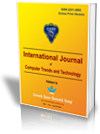E-Learning Quality Criteria and Aspects

Reema Ajmera , Dinesh Kumar Dharamdasani."E-Learning Quality Criteria and Aspects". International Journal of Computer Trends and Technology (IJCTT) V12(2):90-93, June 2014. ISSN:2231-2803. www.ijcttjournal.org. Published by Seventh Sense Research Group.
Abstract -
As IT grows the impact of new technology reflects in more or less every field. Education also gets new dimensions with the advancement in IT sector. Nowadays education is not limited to books and black boards only it gets a new way i.e. electronic media. Although with e-learning, the education having broader phenomena, yet it is in budding stage. Quality is a crucial issue for education as well as e-learning. It is required to serve qualitative and standardization education. Quality cannot be expressed and set by a simple definition, since in itself quality is a very abstract notion. The specified context and the perspectives of users need to be taken into account when defining quality in e-learning. It is also essential to classify suitable criteria to address quality.
References
[1] Handbook on Quality and Standardisation in E-Learning By Ulf-Daniel Ehlers, Jan Martin Pawlowski
[2] Naidu, S. (2003) “Designing instruction for e-learning” . In M. G. Moore & B. G. Anderson (Eds.), Handbook of Distance Education (pp. 349-365), London, UK: Lawrence Earlbaum Associates, Publishers
[3] http://en.wikipedia.org/wiki/Sharable_Content_Object_Reference_Model
[4] Romiszowski, A. (2004). How’s the e-learningbaby? Factors leading to success or failure of an educational technology innovation, Educational Technology,44(1), January-February, 5-27.
[5]Mona Alkhattabi,Daniel Neagu Information Quality Framework for e-Learning Systems, Knowledge Management & E-Learning: An International Journal, Vol.2, No.4 pp-340-362
Keywords
Synchronous, Quality, Scenario based learning, Problem based learning


